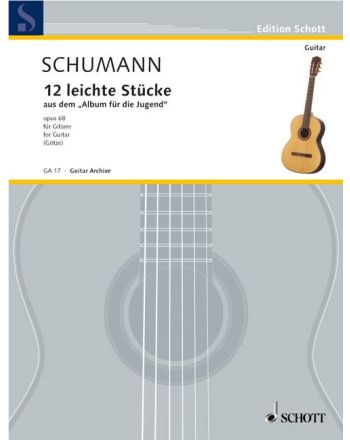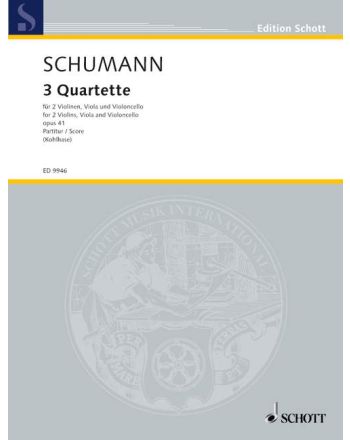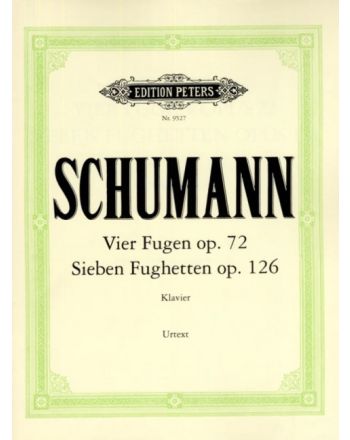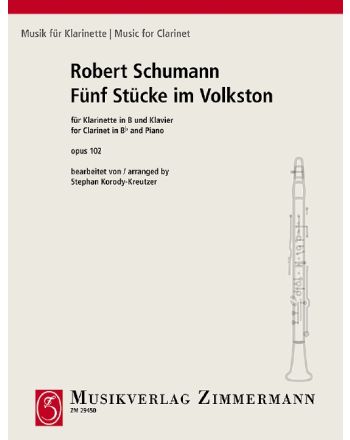Recommended products

Robert Schumann
Country of origin:
Germany
Birthday:
June 8, 1810
Date of death:
July 29, 1856
About Robert Schumann
Robert Schumann, major composer of the High Romantic era.
Life:
Schumann, who was also a highly gifted writer, had his first piano lessons at an early age; in 1828/29 he studied law in Leipzig and Heidelberg, but soon devoted himself entirely to the music. In addition to his piano lessons with Friedrich Wieck (*1785, 1873) and studies of theory, he pursued his own studies on the basis of Bach's "Well-Tempered Clavier" which were later taken up and intensified in the BACH Fugues Op. 60 (1845). A pulled tendon in one of his fingers put an end to his career as a virtuoso pianist. At the same time, he wrote his first compositions, until 1839 almost exclusively for the piano. In 1834 Schumann founded the "Neue Zeitschrift für Musik" in which the invented "Davidsbündler" (most notably Eusebius and Florestan as personifications of two sides of his own personality) fought for a new true and poetic concept of music, for true productive criticism as well as against artistic Philistines and light salon music.
Life:
Schumann, who was also a highly gifted writer, had his first piano lessons at an early age; in 1828/29 he studied law in Leipzig and Heidelberg, but soon devoted himself entirely to the music. In addition to his piano lessons with Friedrich Wieck (*1785, 1873) and studies of theory, he pursued his own studies on the basis of Bach's "Well-Tempered Clavier" which were later taken up and intensified in the BACH Fugues Op. 60 (1845). A pulled tendon in one of his fingers put an end to his career as a virtuoso pianist. At the same time, he wrote his first compositions, until 1839 almost exclusively for the piano. In 1834 Schumann founded the "Neue Zeitschrift für Musik" in which the invented "Davidsbündler" (most notably Eusebius and Florestan as personifications of two sides of his own personality) fought for a new true and poetic concept of music, for true productive criticism as well as against artistic Philistines and light salon music.
In 1840 Schumann married Wieck's daughter Clara against her father's wishes and in the same year composed about 150 songs for voice and pianoforte. In 1841 he wrote, often almost in no time, a number of major chamber music works and in 1842, sometimes similarly quickly and eruptively, two symphonies and other music for the orchestra, including the first movement of the Piano Concerto in A minor Op. 54. In 1843 Schumann came to the newly founded Conservatoire in Leipzig through Mendelssohn Bartholdy, a close friend of his; in 1844 he went to Dresden as choral director. In 1850 he became municipal musical director in Düsseldorf, where Brahms visited him in 1853, but after some time he faced humiliation and intrigues. An emotional disorder (depression, delusion), the first symptoms of which had already appeared at an early age, fully manifested itself in 1854. After a suicide attempt (when he threw himself into the river Rhine) he was committed to an asylum where he remained until his death.
Oeuvre:
In terms of musical history, Schumann's oeuvre is in the middle of German High Romanticism. His poetic and fantastic virtuoso piano oeuvre was created right after Beethoven's and Schubert's deaths, transforming ideas of Jean Paul and of literary Romanticism (e.g. of E.T.A. Hoffmann) into music. He used Beethoven's motivic work for the most differentiated moods and further developed Schubert's bold harmony and songlike melody into a complex pianistic sound. In some works, he expanded the sonata form in an imaginative way, but for the most part avoided it by arranging short character pieces into cycles. The headings of his works prompt associations but are not to be taken in the sense of concrete extra-musical contents.
In Schumann's songs, the piano part stands out independently and characteristically, entirely inspired by the poet's words. Apart from many others, poems by Goethe and especially Heinrich Heine and Joseph von Eichendorff are interpreted adequately here. Schumann's chamber music with piano captivates with the pile of great ideas as well as the constant desire for a dense stylistic form. His string quartets tend toward post-classical intimate lyricism. Schumann's critical analysis of Beethoven's example is most noticeable in his symphonies. Nonetheless, Schumann's four symphonies are prominent examples of the genre, each with characteristic thematic and formal structures. In the fields of opera (»Genoveva«) and oratorio (»Paradise and the Peri«) Schumann created independent works which, unjustly, are performed very rarely. A wealth of forms and of shades of Romantic expressions can be found in his choral music as well.
Until 1842, almost every work by Schumann was brilliant and highly successful. Later, less original, classically Biedermeier-like compositions alternate with highly important ones. Schumann's style and attitude decisively influenced Brahms with regard to history, Hugo Wolf in particular with regard to the lied, and the whole further development in the late 19th century with regard to piano music. His oeuvre marked the beginning of the separation between a rather traditional compositional style (Schumann, Mendelssohn Bartholdy, Brahms) and a progressive style (New German School) some representatives of which (e.g. Liszt), however, were known and greatly valued by Schumann who, with his Romantic complex personality and his awareness of the difficulty to harmonize poetically universal aspiration with his late position in history, represents a new modern type of artist. His writings, testimony to a typically Romantic double talent, are lasting examples of productive music criticism and selfless recognition even of unfamiliar, different creative concepts.
Works:
Piano music: Papillons Op.2 (182932); Davidsbündlertänze Op.6 (1837); Carnaval Op.9 (1834/35); Sonata No. 1 in F sharp minor Op.11 (183335); Fantasy Pieces Op.12 (1837); Symphonic Studies Op.13 (183437); Scenes from Childhood Op.15 (1838); Kreisleriana Op.16 (1838); Sonata No. 2 in G minor Op.22 (183338); Album for the Youth Op.68 (1848).
Orchestral works: 4 symphonies, No. 1 in B flat major Op.38 (1841, »Spring Symphony«), No. 2 in C major (1845/46), No. 3 in E flat major Op.97 (1850, »Rhenish Symphony«), No. 4 in D minor Op.120 (1851, 1st version 1841); overtures, from the music of Lord Byron's dramatic poem »Manfred« Op.115 (1848/49) among others; Piano Concerto in A minor Op.54 (184145); Cello Concerto in A minor Op.129 (1850).
Chamber music: 3 string quartets in A minor, F major, A major Op.41, 13 (1842); Piano Quintet in E flat major Op.44 (1842); Piano Quartet in E flat major Op.47 (1842); 3 piano trios, 3 violin sonatas.
Vocal works: Opera »Genoveva« Op.81 (184749); secular oratorio »Paradise and the Peri« Op.50 (184143); choral music with and without accompaniment; more than 300 songs for voice and pianoforte, including the cycles »Myrthen« Op.25 (1840, various poets), »Liederkreis« Op.39 (1840, Eichendorff); »Frauenliebe und -leben« Op.42 (1840, Adelbert von Chamisso), »Dichterliebe« Op.48 (1840, Heine).
Products
-
Composer: Robert SchumannEditor: Ute BaerMedia Type: Sheet musicEdition: complete editionSeries: Robert Schumann - New Edition of Complete Works , Vol. 3
Brand: Schott Music
Instrumentation: violin and pianoProduct number: RSA 1014£354.99Not in stock, but can be ordered - usually despatched (or ready for collection) within 7 days -
Composer: Robert SchumannMedia Type: Sheet musicBrand: Edition Peters
Instrumentation: mixed choir a cappellaLanguage: GermanProduct number: EP4694£8.95Not in stock, but can be ordered - usually despatched (or ready for collection) within 7 days -
Composer: Robert SchumannEditor: Harry JoelsonMedia Type: Sheet musicEdition: Score and partsBrand: Amadeus
Instrumentation: violin, cello and pianoProduct number: BP2314£21.99Not in stock, but can be ordered - usually despatched (or ready for collection) within 7 days -
aus dem "Album für die Jugend"Series: Edition Schott
Guitar Archive
Brand: Schott Music
Instrumentation: guitarProduct number: GA 17Product TypeAs low as £8.50 -
from "Album für die Jugend"Composer: Robert SchumannEditor: Walter Wilhelm Goetze | Walter GötzeSeries: Edition Schott
Guitar Archive
Brand: Schott Music
Instrumentation: 2 guitarsProduct number: GA 18Product TypeAs low as £8.50 -
für Frauenstimmen und KlavierComposer: Robert SchumannMedia Type: Sheet musicEdition: PartiturBrand: Edition Peters
Instrumentation: female choir and pianoLanguage: GermanProduct number: EP2393£12.95Not in stock, but can be ordered - usually despatched (or ready for collection) within 7 days -
aus op. 29, 69, 91 und 115Composer: Robert SchumannMedia Type: Sheet musicEdition: Choral part, 2. AltBrand: Edition Peters
Instrumentation: female choirProduct number: EP2393A2£3.95Not in stock, but can be ordered -
aus op. 29, 69, 91 und 114Composer: Robert SchumannMedia Type: Sheet musicEdition: Choral part, 1. AltBrand: Edition Peters
Instrumentation: female choirProduct number: EP2393A1£3.95Not in stock, but can be ordered -
aus op. 29, 69, 91 und 117Composer: Robert SchumannMedia Type: Sheet musicEdition: Choral part, 2. SopranBrand: Edition Peters
Instrumentation: female choirProduct number: EP2393S2£3.95Not in stock, but can be ordered -
aus op. 29, 69, 91 und 116Composer: Robert SchumannMedia Type: Sheet musicEdition: Choral part, 1. SopranBrand: Edition Peters
Instrumentation: female choirProduct number: EP2393S1£3.95Not in stock, but can be ordered -
Sonate fis-moll op. 11, Sonate g-moll op. 22Composer: Robert SchumannEditor: Hans Joachim KoehlerMedia Type: Sheet musicBrand: Edition Peters
Instrumentation: pianoProduct number: EP9509£15.50Not in stock, but can be ordered - usually despatched (or ready for collection) within 7 days -
Vol. 1 | mit Klavierbegleitung von Robert SchumannComposer: Niccolò Paganini | Niccolò Paganini | Robert SchumannEditor: Georg SchuenemannMedia Type: Sheet musicEdition: PartiturBrand: Edition Peters
Instrumentation: violin and pianoProduct number: EP4497A£26.95Not in stock, but can be ordered - usually despatched (or ready for collection) within 7 days -
Vol. 2 | mit Klavierbegleitung von Robert SchumannComposer: Niccolò Paganini | Niccolò Paganini | Robert SchumannEditor: Georg SchuenemannMedia Type: Sheet musicEdition: PartiturBrand: Edition Peters
Instrumentation: violin and pianoProduct number: EP4497B£26.95Not in stock, but can be ordered - usually despatched (or ready for collection) within 7 days -
UrtextausgabeComposer: Robert SchumannEditor: Hans Joachim KoehlerMedia Type: Sheet musicEdition: Performing scoreBrand: Edition Peters
Instrumentation: pianoProduct number: EP9513£8.50Not in stock, but can be ordered - usually despatched (or ready for collection) within 7 days -
Composer: Robert SchumannEditor: Ernst HerttrichMedia Type: Sheet musicBrand: Henle Verlag
Instrumentation: pianoProduct number: HN89£7.99Not in stock, but can be ordered - usually despatched (or ready for collection) within 7 days -
Composer: Robert SchumannEditor: Anna PasettiMedia Type: Sheet musicInstrumentation: Voice and Harp (Piano)Product number: MAG180£14.50Not in stock, but can be ordered - usually despatched (or ready for collection) within 7 days
-
Composer: Robert SchumannMedia Type: Sheet musicBrand: Edition Peters
Instrumentation: pianoProduct number: EP9525£12.50Not in stock, but can be ordered -
Composer: Robert SchumannEditor: Joachim Draheim | Clara SchumannMedia Type: Sheet musicBrand: Breitkopf & Härtel
Instrumentation: pianoProduct number: EB 8444£17.91Not in stock, but can be ordered - usually despatched (or ready for collection) within 7 days -
Composer: Robert SchumannMedia Type: Sheet musicEdition: Choral scoreBrand: Edition Peters
Instrumentation: men´s choirLanguage: GermanProduct number: EP2527B£4.25Not in stock, but can be ordered -
Composer: Robert SchumannEditor: Anna PasettiMedia Type: Sheet musicInstrumentation: harpProduct number: MAG255£10.95Not in stock, but can be ordered - usually despatched (or ready for collection) within 7 days
-
for 2 Violins, Viola and VioloncelloComposer: Robert SchumannEditor: Hans KohlhaseEdition: Set of partsSeries: Edition Schott
Brand: Schott Music
Instrumentation: string quartetProduct number: ED 9946-10Product TypeAs low as £36.99 -
for 2 Violins, Viola and VioloncelloComposer: Robert SchumannEditor: Hans KohlhaseEdition: PartiturSeries: Edition Schott
Brand: Schott Music
Instrumentation: string quartetProduct number: ED 9946Product TypeAs low as £25.50 -
Composer: Robert SchumannEditor: Ernst HerttrichMedia Type: Sheet musicBrand: Henle Verlag
Instrumentation: pianoProduct number: HN85£9.50In stock - usually despatched (or ready for collection) within 1 working day -
Composer: Robert SchumannEditor: Willy KlasenMedia Type: Sheet musicEdition: PartiturSeries: Komponistenportraits
Brand: Universal Edition
Instrumentation: pianoProduct number: UE531Special Price £6.38 Regular Price £8.50Not in stock, but can be ordered - usually despatched (or ready for collection) within 7 days -
Breitkopf UrtextComposer: Robert SchumannEditor: Joachim DraheimMedia Type: Sheet musicSeries: ABRSM Oboe Grade 7 (from 2022)
Brand: Breitkopf & Härtel
Instrumentation: oboe (violin/ clarinet) and pianoProduct number: EB 8632£9.81In stock - usually despatched (or ready for collection) within 1 working day -
(Anh:Abendlied aus op.85/12)Composer: Robert SchumannEditor: Kurt MeierMedia Type: Sheet musicBrand: Amadeus
Instrumentation: oboe and pianoProduct number: BP338£16.50Not in stock, but can be ordered - usually despatched (or ready for collection) within 7 days -
neu durchgesehen von Rüdiger Bornhöft, mit RevisionsberichtComposer: Robert SchumannMedia Type: Sheet musicBrand: Edition Peters
Instrumentation: pianoProduct number: EP9521£8.95Not in stock, but can be ordered -
Composer: Robert SchumannMedia Type: Sheet musicEdition: Set of partsBrand: Edition Peters
Instrumentation: oboe (or violin) and pianoProduct number: EP2387£11.50Not in stock, but can be ordered - usually despatched (or ready for collection) within 7 days -
Media Type: Sheet musicBrand: Editio Musica Budapest
Instrumentation: FL (OB) KLAVProduct number: EMB 12841£11.95Not in stock, but can be ordered -
Composer: Robert SchumannEditor: Max FriedlaenderMedia Type: Sheet musicBrand: Edition Peters
Instrumentation: 2 voices and pianoLanguage: GermanProduct number: EP2392£18.50Not in stock, but can be ordered - usually despatched (or ready for collection) within 7 days -
Composer: Robert SchumannMedia Type: Sheet musicEdition: Set of partsBrand: Edition Peters
Instrumentation: violin, cello and pianoProduct number: EP2378£18.95Not in stock, but can be ordered - usually despatched (or ready for collection) within 7 days -
Composer: Robert SchumannEditor: Hans Joachim KoehlerMedia Type: Sheet musicBrand: Edition Peters
Instrumentation: pianoProduct number: EP9527£9.95Not in stock, but can be ordered -
Composer: Robert SchumannEditor: Hans Joachim KoehlerMedia Type: Sheet musicBrand: Edition Peters
Instrumentation: pianoProduct number: EP9522£8.50Not in stock, but can be ordered -
Composer: Robert SchumannMedia Type: Sheet musicBrand: Edition Peters
Instrumentation: pianoProduct number: EP9529£8.95Not in stock, but can be ordered -
Album für die JugendComposer: Robert SchumannEditor: Holger M. StueweMedia Type: Sheet musicEdition: Performing scoreSeries: Urtext
Brand: Bärenreiter
Language: German, EnglishProduct number: BA 9641£13.50Not in stock, but can be ordered - usually despatched (or ready for collection) within 7 days -
Composer: Robert SchumannArranger: Stephan Korody-KreutzerSeries: Musik for Clarinet
Brand: Zimmermann Verlag
Instrumentation: clarinet and pianoProduct number: ZM29450Product TypeAs low as £11.50 -
Breitkopf UrtextMedia Type: Sheet musicBrand: Breitkopf & Härtel
Instrumentation: violin and pianoProduct number: EB 8473£20.25Not in stock, but can be ordered - usually despatched (or ready for collection) within 7 days -
Breitkopf UrtextComposer: Robert SchumannEditor: Joachim DraheimMedia Type: Sheet musicBrand: Breitkopf & Härtel
Instrumentation: cello and pianoProduct number: EB 8456£18.81Not in stock, but can be ordered - usually despatched (or ready for collection) within 7 days -
Composer: Robert SchumannMedia Type: Sheet musicEdition: Choral scoreBrand: Edition Peters
Instrumentation: men´s choirLanguage: GermanProduct number: EP2527A£7.95Not in stock, but can be ordered -
Composer: Robert SchumannMedia Type: Sheet musicBrand: Edition Peters
Instrumentation: organProduct number: EP9530£19.95Not in stock, but can be ordered -
für Orgel oder PedalklavierComposer: Robert SchumannMedia Type: Sheet musicEdition: Performing scoreBrand: Edition Peters
Instrumentation: Organ (Pedalflügel)Product number: EP2382£19.90Not in stock, but can be ordered -
Composer: Robert SchumannMedia Type: Sheet musicEdition: Set of parts, 4/3/2/2/1Brand: Doblinger Verlag
Instrumentation: string orchestraProduct number: 74 007-SET£96.50Not in stock, but can be ordered -
Composer: Robert SchumannMedia Type: Sheet musicEdition: ViolaBrand: Doblinger Verlag
Instrumentation: string orchestraProduct number: 74 007-VA£8.50Not in stock, but can be ordered -
Composer: Robert SchumannMedia Type: Sheet musicEdition: Violin 2Brand: Doblinger Verlag
Instrumentation: string orchestraProduct number: 74 007-V2£8.50Not in stock, but can be ordered -
Composer: Robert SchumannMedia Type: Sheet musicEdition: Violin 1Brand: Doblinger Verlag
Instrumentation: string orchestraProduct number: 74 007-V1£8.50Not in stock, but can be ordered -
Composer: Robert SchumannMedia Type: Sheet musicEdition: PartiturBrand: Doblinger Verlag
Instrumentation: string orchestraProduct number: 74 007-PA£34.95Not in stock, but can be ordered -
Composer: Robert SchumannMedia Type: Sheet musicEdition: CelloBrand: Doblinger Verlag
Instrumentation: string orchestraProduct number: 74 007-C£8.50Not in stock, but can be ordered -
Composer: Robert SchumannMedia Type: Sheet musicBrand: Breitkopf & Härtel
Instrumentation: organProduct number: EB 6725£21.51Not in stock, but can be ordered - usually despatched (or ready for collection) within 7 days -
£11.95Not in stock, but can be ordered
-
Composer: Robert SchumannEditor: Harry JoelsonMedia Type: Sheet musicEdition: Score and partsBrand: Amadeus
Instrumentation: violin, cello and pianoProduct number: BP2032£17.50Not in stock, but can be ordered - usually despatched (or ready for collection) within 7 days




























